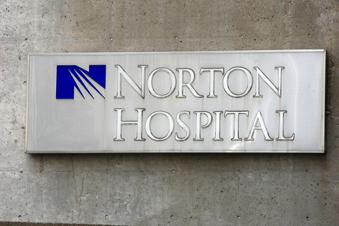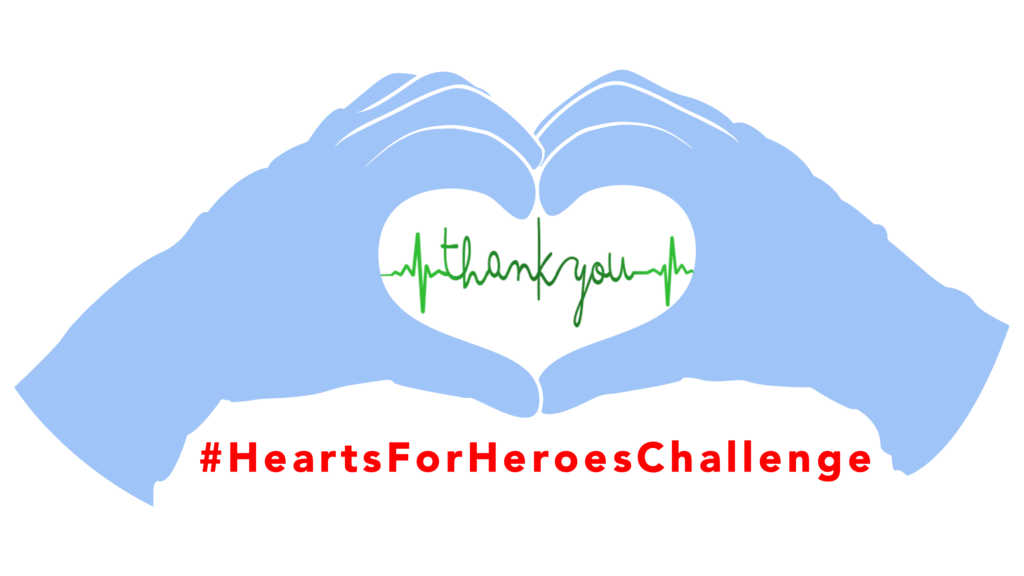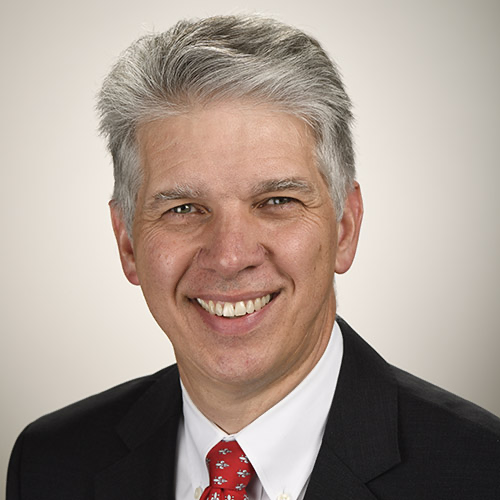The Center for Interfaith Relations recently partnered with Compassionate Louisville to launch a social media campaign thanking healthcare workers for their perseverance on the frontlines of COVID-19. As part of this effort, CIR convened a group of Youth Ambassadors to help facilitate the campaign, dubbed the Hearts for Heroes Challenge. These high school students have played an integral role in the effort, helping to design the challenge, facilitate social media posts, and gather stories from those impacted by COVID-19.
North Oldham High School senior Michael Carroll is one of those students. He recently talked with the Rev. Ronald Oliver, Norton Healthcare’s VP of Mission and Outreach. Rev. Oliver has been a chaplain for more than 31 years, all of which have been spent at Norton. Below is an excerpt of their conversation, during which Oliver shared thoughts on how COVID-19 has impacted healthcare workers, the importance of connection, and what he hopes “the new normal” will look like after the pandemic.
By Michael Carroll
How has your role changed since the beginning of this pandemic?
Rev. Ronald Oliver: The chaplains became much more employee-care focused… The virus is impacting our employees in much more stressful ways than normal hospital work.
Early on, people didn’t understand how the virus was transmitted. There were PPE (personal protective equipment) everywhere. People weren’t sure how to keep their families from getting sick when they got home. There was a lot of secondary traumatic stress. We had employees who were sleeping in their mobile RV and they weren’t going in to see their families. People were sleeping in a hotel room, because they just didn’t know and they were really, really scared.
That has largely receded. We understand how it is transmitted, so we understand how to prevent transmission… We have masks, we have ventilators, we know what we need. Now what employees deal with is the grind and the burn out. This is not unique to Norton.
Tell us about your department and what the job of chaplains has entailed this past year.
The chaplains are largely the group doing the employee care and patient care.
My office has also been working to help employees who have experienced financial challenges through this time. We have an emergency relief fund we manage. You can easily imagine how this has stressed families with someone losing their job, so we help employees with things like that.
Didn’t you do a Christmas toy drive recently to help employees? Tell us about that.
It went really well! I’ve said this before: “Never waste a crisis.” Social distancing really forced us to rethink how we do this. We made it a drive-thru drop-off and pick-up. It worked well and we got really good feedback. We have worked really hard in the past to ensure that our recipients have a very dignified experience, as no one wants to feel like they are an object of charity. The act of having to park the car and come in can be really hard for some people. So to be able to stay in your car… we may continue to do it that way.
What is the most challenging part of your day during the pandemic as opposed to pre-pandemic?
There were months where I was the only person in the office. The secretary and other staffers were remote, and I felt like I needed to be here… You get isolated. I tend to live with the view that we humans do not do very well in isolation. It’s one thing to be an introvert but imposed isolation is different.
I think the term social isolation is unfortunate. I wish we talked about physical distancing, which I think we should use as more of the mantra than social distancing. I think we can still be connected.
What made you want to become a chaplain?
Something that has remained constant all the way through from high school until now: I’ve always had this deep interest and concern for people trying to understand life and their place in it. To put it into the words of [Harold] Kushner’s book, “Why Do Bad Things Happen to Good People?” How do you understand life and your place in it? When awfulness imposes itself in really unwanted and unwelcome ways, how does life happen? For My doctoral dissertation, I interviewed parents whose children had died traumatic deaths, and I sought to understand how they were coping and how their faith was impacted…
When I first did clinical training in a hospital, I thought, Oh wow. This is a daily occurrence to spend time with people who are really struggling to understand life and the circumstances that were largely thrust upon them… For some people, their way of understanding God and the way the world works just goes away. To be able to spend some time with those folk and rebuild some of that with them is a great personal honor.
You started in the children’s pediatric intensive care unit, so I’m guessing you learned rather quickly how to deal with the stress of that job. How are you dealing with the stress of the pandemic?
I think coping is an emotional muscle group. It’s a spiritual muscle group that allows you to do certain things. If you want to go out and run 50 miles, you don’t just decide to do that. You have to prepare.
One thing I do is tell myself there is one side of the line where you can cope and there is the other side where you need help. So it’s important to know what side of the line your situation is on. Some people draw the line in so many different places. Other people never draw the line and never ask for help.
 What are things you can ask of the people who are going to read this? What can they do?
What are things you can ask of the people who are going to read this? What can they do?
What Norton needs is really what the world needs: Wash your hands, wear a mask, stay away from groups, and get vaccinated. If people would do that this would kinda go away.
We are going to have to admit that we cannot will this away. It will take behavioral change, and we in this country don’t like being told what to do. To be told we have to wear a mask makes us want to push back. Other countries like Australia have gone so many days without a case. If we get out of our bubble and look at the world in terms of deaths-per-thousands we are at the top of that list, and it’s largely behavioral. We have more resources than anyone. Wear your mask and wear it correctly, stay away from people you don’t know, and wash your hands. Then we can all have a nice Fourth of July.
Has the vaccine changed the conversion at Norton? Has it brought hope?
I think there is a collective sigh of relief we have turned a corner and crested the hill. The variants have injected — excuse the use of that term — some amount of uncertainty into the silver-bulletness of the vaccine. We are waiting for that to play itself out. The bottom line is we want to make sure people do what they have to do. We want people to get vaccinated, but that is not a free pass to go do what you want. I may be wrong, but I haven’t seen any research that just because you have the vaccine doesn’t mean you can’t be a carrier. We have to remain vigilant in that regard. We are now 11 months into this and we are learning a lot about the human capacity to normalize things. We have normalized masks and carry it out.
Have you received the vaccine, and how was that experience for you?
My route was a little bit different in that I am a part of the Johnson & Johnson trial. I signed up in November, and then in December I got a shot. Now I didn’t know if it was the vaccine or a placebo. I participated in the trial because this is something I can do for the good of humanity… The caveat of participating in the study was that if Norton offered me the vaccine, they would what they call “unblind” me. So they would tell me if I got the vaccine or if I just got the placebo. So when Norton extended the invitation, I learned I actually got the Johnson & Johnson vaccine on Dec. 9.
Nice! Congratulations.
Well their efficacy just came out last week, and it isn’t as good as Moderna and Pfizer, but it’s nearly perfect on preventing serious disease, hospitalizations and death. It doesn’t seem to do as well on the low-level illness. But they may follow up with a second dose and that might do it.
When the pandemic is over, even if we still have to wear our masks, what are you looking forward to the most?
I think it’s having lunch with people, connecting with people in real ways. Having people over, and not living with anxiety.
More casual interactions?
Yes. And not having to worry about the force of protection around you. Somebody said, “Before we get back to normal we need to decide if that normal was worth getting back to.” What we need to solidify and integrate is this awareness of what we find valuable in life, because it’s missing right now. We find it valuable and probably had been taking it for granted for a long time.
We need to figure out what was really important that we missed that was raised up by this experience, and how do we change our life to create the new normal. In light of those new values, if we just say we are going to carve this out and throw it in the waste basket of what we call 2020, we missed all of what we could learn.
At my core, I believe in redemption. God’s work is to salvage all things. In all things God is working for good. How do we salvage this, how do we redeem this, for some measure of good? How does it change us? How does it alert us to our interconnectivity and what does that mean for the environment? What does that mean for the way we take care of others?
I hope that I find myself resisting getting back to normal. I am more interested in figuring out what the new normal is going to be in light of clarified values and new awareness, and building toward that.
Note: This conversation was edited for length and clarity.
[/fusion_text][/fusion_builder_column][/fusion_builder_row][/fusion_builder_container]

